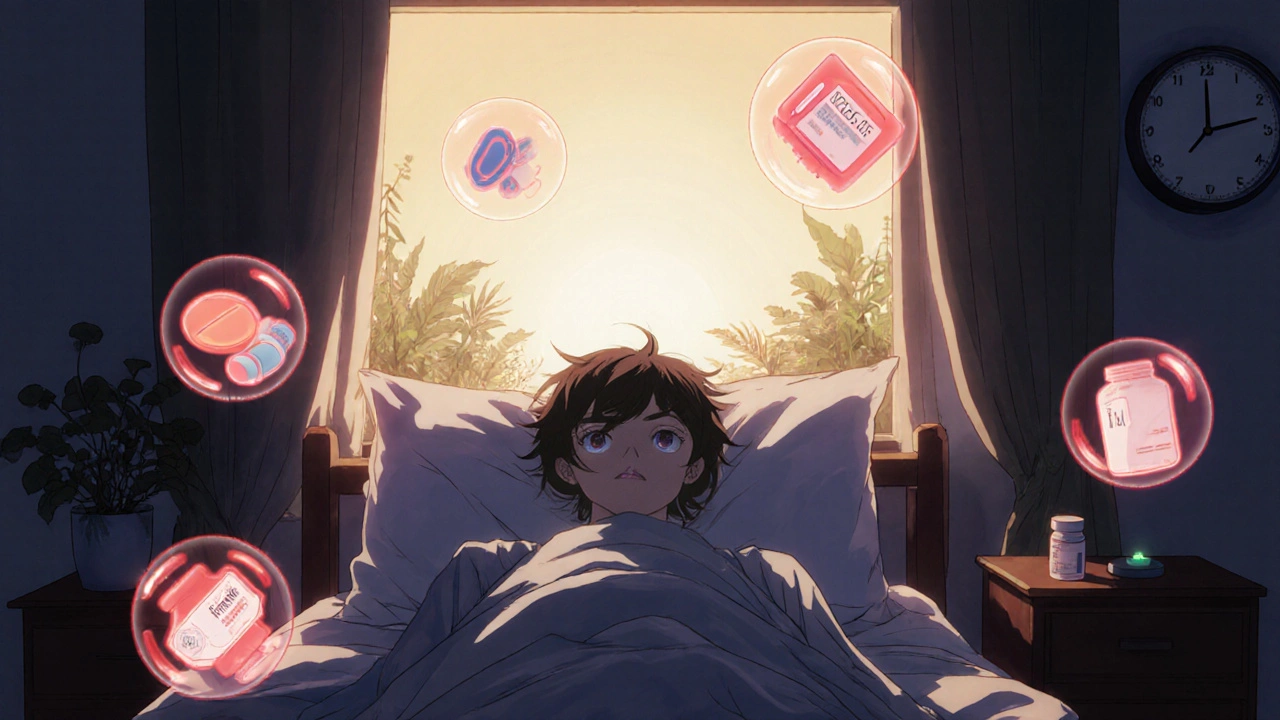When Your Medication Keeps You Awake-or Makes You Sleep Too Much
You take your pill every morning like clockwork. It helps your blood pressure, your mood, your heart. But at night? You’re wide awake. Or worse-you fall asleep fine, but wake up feeling like you’ve been dragged through a mud pit. Your brain is foggy. Your body is heavy. You can’t focus at work. You’ve started forgetting where you put your keys. And you’re not sure if it’s the meds, your stress, or just bad luck.
It’s not luck. It’s likely your medication.
More than half of adults in New Zealand and the U.S. take at least one prescription drug. And many of those drugs-antidepressants, beta blockers, even sleep aids themselves-mess with your natural sleep rhythm. You might think, “I’ll just take another pill to fix this.” But that’s like pouring water on a burning engine. The problem isn’t that you need more sleep medicine. It’s that your body’s sleep system is already under attack.
Here’s the truth: sleep hygiene isn’t just about avoiding caffeine before bed. It’s your most powerful, science-backed tool to undo the damage caused by medications that interfere with sleep. And you don’t need to stop your meds to make it work.
How Medications Actually Break Your Sleep
Not all sleep problems are the same. Some meds make it hard to fall asleep. Others keep you from reaching deep, restorative sleep. And some leave you groggy all day-even if you slept eight hours.
Take SSRIs like fluoxetine (Prozac). They boost serotonin, which helps with depression-but serotonin also suppresses melatonin, the hormone that tells your body it’s time to sleep. So even if you take it in the morning, your brain might still be fighting sleep at midnight.
Beta blockers like metoprolol (Lopressor) are even sneakier. They lower your heart rate and blood pressure, which is good for your heart-but they also slash your body’s natural melatonin production by nearly 40%. That means your internal clock gets confused. You feel tired at the wrong times. You wake up too early. You can’t fall back asleep.
And then there’s the irony: sleep medications themselves. Zolpidem (Ambien), eszopiclone (Lunesta), temazepam-they’re supposed to help you sleep. But they often leave you with next-day drowsiness, memory gaps, or even sleep-driving episodes. Studies show 68% of people on these drugs report feeling foggy the next morning. That’s not sleep. That’s chemical sedation with side effects.
And here’s the kicker: long-term use of these drugs is linked to a higher risk of dementia. One major study tracked nearly 90,000 people over eight years and found those using sleep meds regularly had a 138% higher chance of developing dementia.
You’re not broken. Your body is just reacting to chemicals it wasn’t meant to handle long-term.
What Sleep Hygiene Really Means (When You’re on Meds)
Sleep hygiene isn’t a list of tips from a wellness influencer. It’s a clinical protocol backed by decades of research from the American Academy of Sleep Medicine and the Mayo Clinic. And when medications are involved, it’s not optional-it’s essential.
Here’s what actually works, based on real data from clinical trials and patient outcomes:
- Wake up at the same time every day-even on weekends. This is non-negotiable. Your circadian rhythm doesn’t care if you took a pill last night. It needs consistency. A 2022 JAMA study showed people who woke up within 30 minutes of their usual time every day improved their sleep efficiency by over 58% in just four weeks. Set your alarm. Stick to it. No exceptions.
- Get bright light within 10 minutes of waking. If you’re on beta blockers, your body isn’t making enough melatonin. You need to trick your brain into resetting its clock. Sit by a window with natural sunlight for 15 minutes. Or use a 10,000-lux light therapy box. This tells your brain: “It’s daytime. Stop making sleep hormones.” It’s like hitting a reset button.
- No screens after 8 p.m. Blue light from phones, tablets, and TVs blocks melatonin-even if you’re not on meds. But if your body is already struggling to produce it because of your prescription, this is the final nail in the coffin. Put your phone in another room. Read a book. Listen to a podcast. Your brain will thank you.
- Exercise-but not too late. Movement helps sleep. But if you’re on a stimulating medication like an SSRI, working out too close to bedtime can make insomnia worse. Do your workout at least four hours before bed. Morning walks or lunchtime gym sessions are ideal.
- Don’t take sleep meds unless you can sleep 7-8 hours straight. If you have to wake up at 6 a.m., don’t take zolpidem at 11 p.m. That’s asking for next-day fog. The FDA found that when people took Ambien with only 6 hours of sleep time, residual effects jumped by 32%. Only use sleep meds when you’ve carved out a full, uninterrupted block.
- Watch what you eat. Aged cheeses, cured meats, soy sauce-these are high in tyramine. They can spike your blood pressure and interfere with meds like beta blockers or MAO inhibitors. At the same time, eat more magnesium-rich foods: almonds, spinach, pumpkin seeds, black beans. A 2020 study showed people who added magnesium to their diet saw a 34.7-point drop on the Insomnia Severity Index in just four weeks.

Why Sleep Hygiene Beats More Pills
You might be thinking: “I’ve tried all this. It didn’t work.”
That’s probably because you tried it half-heartedly. Or you didn’t do it long enough. Or you didn’t pair it with a medication review.
The American College of Physicians says this clearly: for chronic insomnia, cognitive behavioral therapy for insomnia (CBT-I) should be the first treatment-not pills. And sleep hygiene is the foundation of CBT-I.
Here’s what happened to 2,315 people in the Sleepio CBT-I program: within six weeks, 71% reported significantly less next-day grogginess from their sleep meds. They didn’t stop their meds. They didn’t add more. They just changed their routine. And their brains started healing.
Meanwhile, prescriptions for sleep medications have dropped 22.4% since 2019-not because they’re less available, but because doctors are finally listening to the data. The FDA now requires a “black box warning” on Ambien, Lunesta, and Sonata because of dangerous side effects. Twenty-eight U.S. states now require doctors to document sleep hygiene education before writing long-term sleep med prescriptions.
It’s not about being “strong enough” to quit meds. It’s about giving your body a chance to heal itself.
Your 21-Day Reset Plan
This isn’t a quick fix. It’s a reset. And it takes time.
Here’s your step-by-step plan:
- Week 1: Audit your meds. Talk to your doctor. Ask: “Which of my medications could be affecting my sleep?” Make a list. Don’t stop anything-just identify the suspects.
- Week 2: Lock in your wake time. Set your alarm for the same time every day. No sleeping in. Even if you got three hours of sleep. Get up. Open the curtains. Drink a glass of water.
- Week 3: Light + no screens. Get 15 minutes of bright light within 10 minutes of waking. No screens after 8 p.m. Use a white noise machine if your room is too quiet.
- Week 4: Adjust your meds timing. If you take a sleep aid, make sure you have at least 7 hours before you need to wake up. If you take a stimulant like an SSRI, move it to the morning if possible.
- Week 5: Add magnesium. Eat a handful of almonds or spinach daily. Or take 200-400 mg of magnesium glycinate at night. It’s safe, non-habit-forming, and helps your brain relax.
- Week 6: Track your progress. Use a simple journal: “Slept? How rested did I feel? Any side effects?” You’ll start seeing patterns. Maybe you feel better on days you didn’t eat cheese. Or after you walked at lunch.
By day 21, your body will start to relearn how to sleep without chemical crutches. It won’t be perfect. But it will be better. And you’ll be in control.

What to Do If It’s Still Not Working
Some people need more help. That’s okay.
If you’ve followed the plan for six weeks and still can’t sleep-or you’re still foggy all day-ask your doctor about a referral to a sleep specialist. Look for someone trained in CBT-I. Many hospitals and clinics now offer digital CBT-I programs like Sleepio or Somryst. These are covered by insurance in most major health systems.
And if you’re elderly? You’re at higher risk for medication side effects. A 2021 study found seniors experience 3.2 times more next-day impairment from sleep meds than younger adults. If you’re over 65, talk to your doctor about reducing or replacing sedating meds with non-drug options. It’s not just about sleep-it’s about safety.
Final Thought: You’re Not Addicted to Sleep. You’re Addicted to Feeling Tired.
Medications don’t cause sleep problems because you’re weak. They cause them because they’re powerful chemicals that override your biology. And the solution isn’t more drugs. It’s giving your body the conditions it needs to heal.
Sleep hygiene isn’t about being perfect. It’s about being consistent. One day at a time. One habit at a time.
You don’t need to quit your meds to sleep better. But you do need to stop letting them run your nights.
Can sleep hygiene help if I’m on antidepressants?
Yes. Many antidepressants, especially SSRIs like fluoxetine, suppress melatonin and make it harder to fall asleep. Sleep hygiene helps by reinforcing your body’s natural rhythm. Key steps: wake up at the same time every day, get bright light in the morning, avoid screens after 8 p.m., and don’t exercise too close to bedtime. These actions counteract the stimulating effects of the medication without changing the dose.
Is it safe to stop my sleep medication and rely only on sleep hygiene?
Never stop a prescription medication without talking to your doctor. Some sleep meds can cause withdrawal symptoms or rebound insomnia. But you can start improving your sleep hygiene while still taking your medication. Over time, as your sleep improves, your doctor may help you reduce the dose safely. Many people find they need less medication-or none at all-after 6-8 weeks of consistent sleep hygiene.
Why does my doctor keep prescribing sleep pills if they’re risky?
Many doctors prescribe sleep meds because they’re quick and easy. But guidelines from the American College of Physicians and the American Academy of Sleep Medicine now recommend CBT-I and sleep hygiene as the first-line treatment. If your doctor hasn’t mentioned these options, ask. You have the right to know about safer, long-term alternatives. Insurance now covers digital CBT-I programs in most places-ask your provider if yours is included.
Can magnesium supplements really help with medication-related insomnia?
Yes. A 2020 study in the journal Nutrients found that taking 200-400 mg of magnesium glycinate daily reduced insomnia severity by 34.7 points on a standard scale. Magnesium helps calm the nervous system and supports melatonin production. It’s especially helpful if you’re on beta blockers, which lower your body’s natural levels. Foods like almonds, spinach, and black beans are great sources, but supplements work faster for people with significant disruption.
I take a beta blocker and wake up at 3 a.m. every night. Why?
Beta blockers reduce melatonin production by up to 37%. This throws off your internal clock. You may fall asleep fine, but your body thinks it’s time to wake up because melatonin drops too early. Fix it by getting bright light within 10 minutes of waking-even if it’s cloudy. This signals your brain to reset its rhythm. Avoid caffeine after noon and keep your bedroom cool and dark. Over time, your body will adjust.
Do I need to buy expensive gadgets for sleep hygiene?
No. A $15 blue light filter app, a white noise machine from Amazon, and a notebook to track your sleep are all you need. The most effective tools are free: consistency in wake time, morning sunlight, and turning off screens. Apple’s Health app now tracks medication-related sleep risks, but you don’t need it. Just write down what you take and how you feel each morning.

